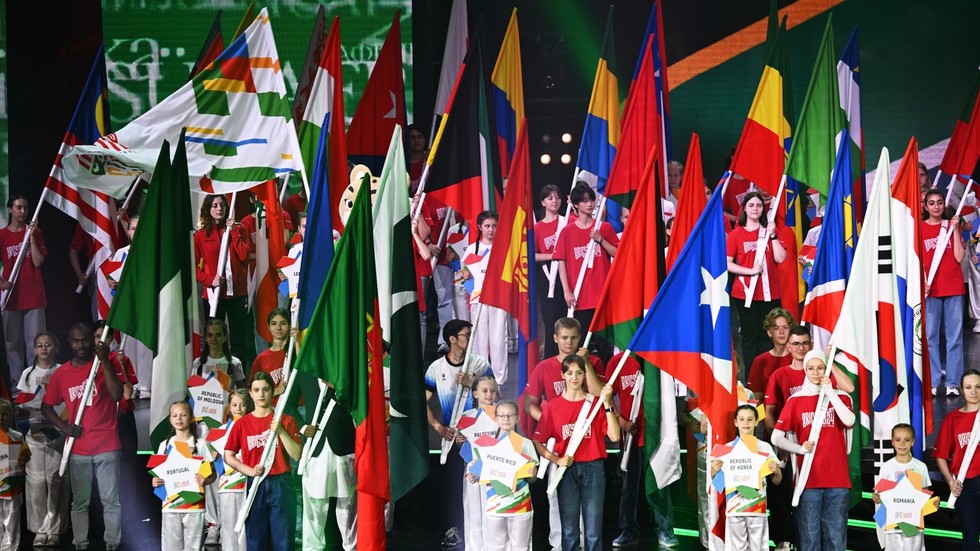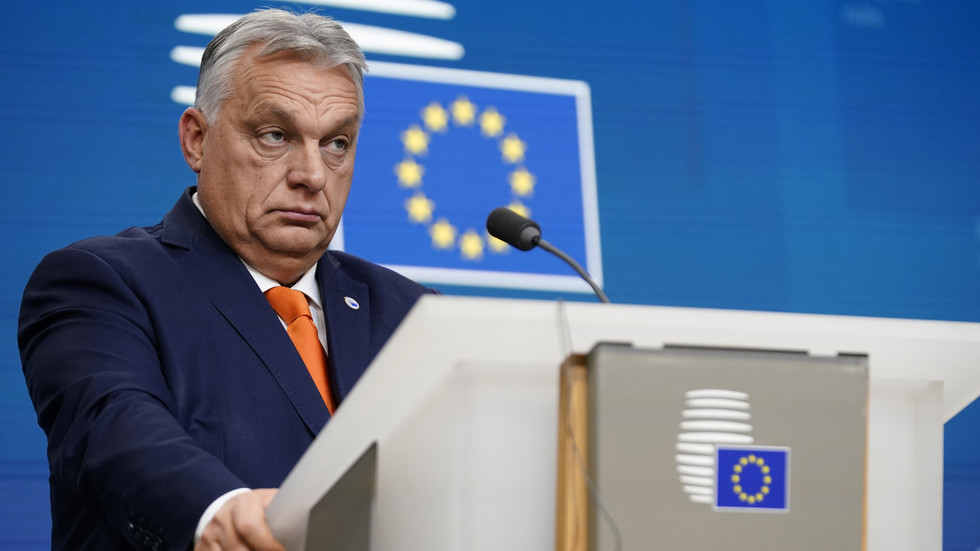
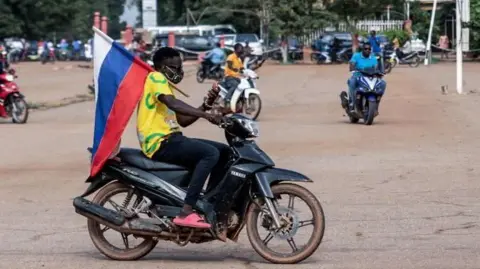 AFP
AFP
Teenage footballers listen to the Russian national anthem before a match. Nearby, artists paint Russian President Vladimir Putin’s portrait on a wall during a graffiti festival.
Welcome to Burkina Faso, one of the African nations where Russia is boosting its operations to gain influence.
Evidence found by the BBC shows that Russia is using media and cultural initiatives to attract African journalists, influencers, and students while spreading misleading information.
These events are being promoted by African Initiative, a newly founded Russian media organisation which defines itself as an “information bridge between Russia and Africa”. It inherited structures previously set up by the dismantled Wagner mercenary group and is believed by experts to have links with the Russian security services.
Registered in September 2023, a month after Wagner’s leader Yevgeny Prigozhin died in a plane crash, African Initiative has welcomed former employees from his disbanded enterprises.
Its efforts have been particularly focused on the three military-run countries of Mali, Niger and Burkina Faso.
Following recent coups, these West African nations have distanced themselves from Western allies like France, criticising their failed interventions against jihadist groups and colonial legacies. They have instead pivoted towards Russia.
Alongside cultural events on the ground, African Initiative maintains a news website with stories in Russian, English, French, and Arabic, as well as a video channel and five Telegram channels, one of which has almost 60,000 subscribers.
Some of the Telegram channels were “recycled” from older ones which had been set up by groups linked to Wagner. They were the first to promote the Russian Defence Ministry's paramilitary group Africa Corps, which has effectively replaced the military wing of Wagner in West Africa.
Pro-Kremlin narratives and misleading information, especially about the United States, are rife.
Stories on the African Initiative’s website suggest without evidence that the US is using Africa as a production and testing ground for bio-weapons, building on long-discredited Kremlin disinformation campaigns.
One story echoes the Kremlin’s unsubstantiated claims about US bio-labs being relocated from Ukraine to Africa. Another maintains without evidence that US bio-labs on the continent are increasing, claiming that “under the guise of research and humanitarian projects, the African continent is becoming a testing ground for the Pentagon”, suggesting that secretive biological experiments are being conducted.
While Prigozhin’s propaganda efforts targeted mainly France, African Initiative “targets Americans to a greater degree,” says researcher Jedrzej Czerep, head of the Middle East and Africa Programme at the Polish Institute of International Affairs. “It’s far more anti-American.”

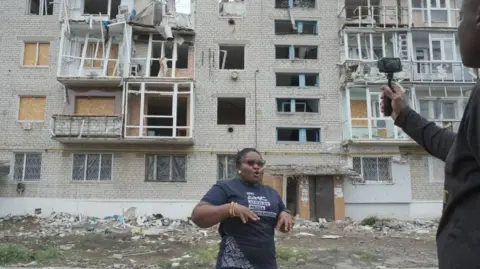 Russdiary (Telegram channel)
Russdiary (Telegram channel)
A Ghanaian journalist, Ivy Setordjie, published a series of reports in which she refers to Russian-occupied towns in Ukraine as "conflict zones in Russia"
In June, a group of bloggers and reporters from eight countries were invited for a seven-day “press tour” of the Russian-occupied areas of Ukraine. The trip was organised by Russian state media and Western-sanctioned Russian officials, and the journalists visited African Initiative’s headquarters in Moscow.
"Africa wasn’t getting much information [about the war]," Raymond Agbadi, a Ghanaian blogger and scientist who studied in Russia and who participated in the “press tour”, told the BBC. "Whatever information we were getting was not convincing enough for us to understand what the war was really about.”
American influencer Jackson Hinkle, a vocal supporter of Russian President Vladimir Putin who has spread multiple false claims about Ukraine, was also on the visit.
After visiting Moscow, the journalists travelled 1,250km (780 miles) to the Ukrainian port city of Mariupol in the Donetsk region. Then they went to towns in the Zaporizhzhia region – all areas which were captured by Russia early in its full-scale invasion of Ukraine.
Throughout the visit, the reporters were accompanied by Russian officials and travelled with the Russian military in vehicles marked with the Z sign – the symbol of Russia's invasion of Ukraine.
In May, African Initiative organised a separate “press tour” to Russian-occupied Mariupol for a delegation of bloggers from Mali.
Press trips for journalists are a widely used tool to attempt to sell a country’s viewpoints. But while “Western media does a lot of progressive training [for journalists] to report on key topics which have become global concerns, Russia uses these guided tours as a way of propagating certain narratives,” says Beverly Ochieng, senior analyst at Control Risks and the Centre for Strategic and International Studies, noting that China organises similar tours.
Having African journalists report on their trips gives an “impression of authenticity” because they “reach out to the audience on languages they recognise”, rather than looking like it is part of “a wider campaign used to portray Russia in a positive light,” says Ms Ochieng.
In stories published since the trip, the African journalists refer to the Ukrainian cities occupied by Russian forces as "conflict zones in Russia" and quote Russian-installed authorities, echoing Russian state propaganda and presenting the Kremlin’s view of Ukraine’s borders.
In a piece published on JoyOnline, an English-speaking website operated by the Multimedia Group, Ghanaian journalist Ivy Setordjie writes that the Ukrainian Zaporizhzhia region [whose capital is under Ukrainian control], is "located in the south of European Russia."
She tells the BBC she disagrees that the regions were illegally annexed by Russia, affirming that her reports are reflections of her own judgement and “not tilted towards” the country.

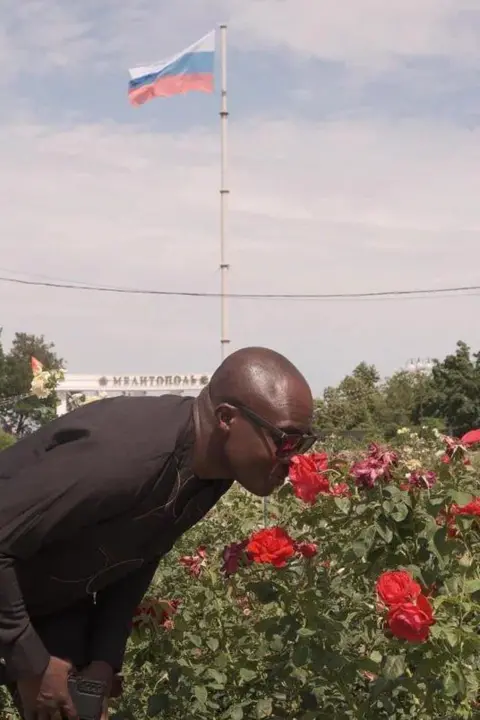 mariupol-news.ru
mariupol-news.ru
African journalists were taken on a seven-day tour of the occupied regions of Ukraine
Beyond press tours, local affiliates of African Initiative in West Africa's Sahel region have been actively involved in community outreach efforts aimed at boosting Russia’s image.
The BBC has been monitoring African Initiative’s Telegram channels and Facebook pages, where videos, images, and reports of their work on the ground are shared.
In Burkina Faso, we found reports about a football competition where the Russian national anthem was played, “friendship lessons” in schools where students are taught about Russia, a competition of the Soviet martial art “sambo”, first aid workshops for citizens and policemen, and a graffiti festival where participants drew Russian President Vladimir Putin alongside Burkina Faso’s former leader Thomas Sankara, all sponsored by African Initiative.
Images also show African Initiative members distributing groceries to locals and neighbourhood screenings of the Wagner-backed documentary The Tourist, about a group of Wagner instructors in the Central Africa Republic, where Wagner and its offshoots have been helping the government fight rebels for several years.
“The original idea with African Initiative was to erase whatever Prigozhin had developed and to replace it with something new. Later on in the process, it appeared that it was more rational to actually reuse all assets that were already there,” says researcher Mr Czerep from the Polish Institute of International Affairs.
The FSB, the Russian Federal Security Service, plays an important part in the new organisation, he notes. The head and editor-in-chief of African Initiative is Artyom Kureyev, identified by Russia experts as a Russian Federal Security Service agent. Mr Kureyev is linked to the Valdai Club, a Moscow-based think-tank close to President Putin.
African Initiative’s website lists Anna Zamaraeva, a former Wagner press officer, as deputy editor-in-chief.

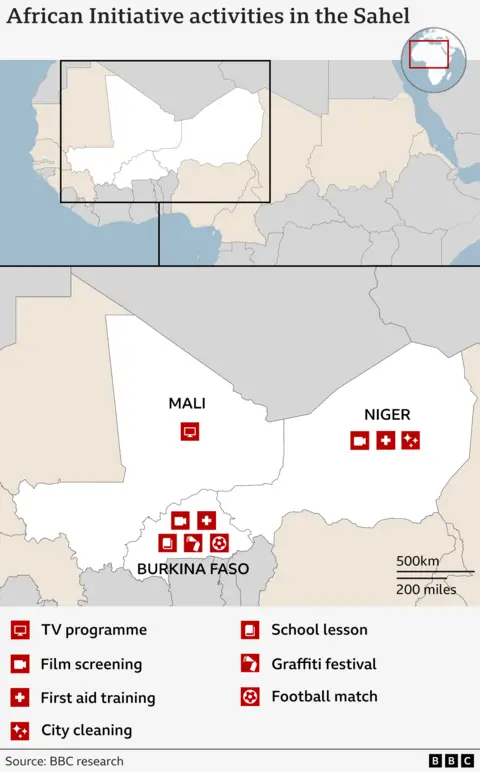
Viktor Lukovenko, known as one of Prigozhin’s “political technologists,” founded the Burkina Faso office of the African Initiative but left the position in recent months. A former Russian nationalist with a criminal past, Mr Lukovenko served five years in prison for an attack in Moscow on a Swiss citizen who later died.
We reached out to African Initiative for comment. Its office in Moscow confirmed it had received our queries but did not respond. We also contacted the Russian government but did not receive a reply.
In February, in response to a report by the US Department of State, an article on African Initiative’s website stated that its editorial board “insists that its purpose is to spread knowledge about Africa in Russia and popularise Russia in African countries”, giving “various Africans an opportunity to be heard, including their criticisms of Western countries”.
Meanwhile, the organisation continues intensifying its outreach in the Sahel. In the last week of August, about 100 students in Burkina Faso attended a talk about training opportunities in Russia.
"I learned about the culture of Russia and the relation between our governments," said a smiling teenager wearing a T-shirt with an African Initiative logo in a video recorded after the discussion.

 3 months ago
12
3 months ago
12






